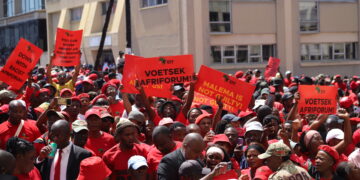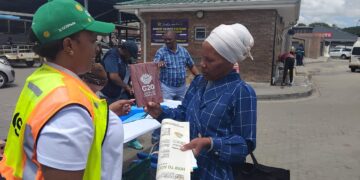Pic: Bishop Zola Yolelo – FB, Graphics: Icamagu News.
By Lulama kaSozathini
MTHATHA – A deadly shooting near Mthatha Airport has left six people dead, including controversial Eastern Cape taxi boss and businessman, Bishop Zola Yolelo. The incident, which unfolded on Monday evening, involved the elite National Intervention Unit (NIU) of the South African Police Service (SAPS), and marks yet another violent chapter in the volatile taxi industry in the region.
According to initial reports, members of the NIU — a specialised tactical unit within SAPS tasked with responding to high-risk operations, including serious violent crimes and taxi violence — were executing an operation targeting suspects allegedly linked to organised crime in the Mthatha area. It is understood that during the operation, a shootout ensued, resulting in the deaths of Yolelo and five others.
While police have not confirmed all the identities of those killed, sources within the investigation suggest that the operation was part of an ongoing crackdown on extortion rings and violence believed to be orchestrated by syndicates embedded in the local taxi and business sectors.
Bishop Zola Yolelo, a prominent figure in the Eastern Cape taxi industry, was no stranger to controversy. He was known not only for his involvement in transportation but also for a highly publicised legal dispute with the Abathembu King, Buyelekhaya Dalindyebo. The court case, which attracted national attention, centred on allegations of defamation and land-related tensions between the two parties. The matter highlighted the complex power dynamics and historical grievances in the region.
Mthatha, once a modest regional hub, has in recent years become a hotspot for extortion, particularly targeting small business owners, developers, and government infrastructure projects. Criminal groups have been known to demand “protection fees,” often under threat of violence. This climate of fear has deeply impacted economic development and stability in the area.
The Eastern Cape government, along with national authorities, has attempted to curb the extortion plague through several initiatives, including the establishment of anti-extortion task teams and increased deployment of tactical units such as the NIU. However, community leaders argue that systemic corruption, limited prosecutions, and the slow pace of reform have hampered progress.
At the time of publication, SAPS had not released an official statement detailing the events of the operation or confirming the identities of all deceased individuals. The Independent Police Investigative Directorate (IPID) is expected to investigate the matter, as is standard procedure in police-involved shootings.
The latest violence has reignited concerns over the effectiveness of state interventions in areas gripped by taxi-related conflict and organised crime. Meanwhile, the deaths of Yolelo and others mark a dramatic and deadly turn in what appears to be a deepening battle for control in one of South Africa’s most turbulent regions.
This is a developing story.




















